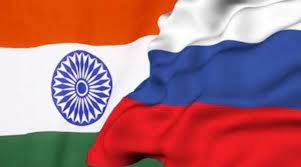World Retaliates Russian Aggression with Stringent Sanctions as India Maintains Neutral Stance3/14/2022 The World’s Sanction Strategy: Global tranquillity was obliterated as Russian President, Vladimir Putin, gave clearance for the commencement of the invasion in Ukraine in the early hours of February 24th. Diplomacy proved feeble as Russian forces vehemently launched multidimensional incursions and encroachments onto Ukrainian territory, attacking major cities and triggering a newfound refugee crisis en route to the capital, Kyiv. Ukrainian military and civilians have displayed incredible valour in counterattacking and valiantly defending their territory, with president Volodymyr Zelenskyy standing steadfast in rallying morale during the crisis. The international community, especially global superpowers such as the U.S. the E.U, and NATO. have refrained from directly intervening in the conflict through the deployment of groups, as full-scale global war is the least desirable outcome, especially between nuclear-armed entities. Their assistance has instead been in the form of humanitarian assistance and stringent sanctions, the latter serving as the international community’s primary defence mechanism against Russia. In the midst of emergent economic calamities, the world’s objective is to obstruct and derail Russian economic prowess as a means of prompting a withdrawal. Starting off with the United States, President Biden announced the imposition of a multitude of sanctions, including but not limited to a prohibition of the export of technological goods to Russia, as well as sanctions on the parent company of the Nord Stream 2 Pipeline responsible for supplying Europe and the World with a bulk of their oil and natural gas. In addition as well as the elimination of the revenue of major Russian economies in U.S. territory. Furthermore, the U.S. effected the removal of select Russian banks from the Society of Worldwide Interbank Financial Telecommunication (SWIFT) international payment system; an international financial transactions communication system interlinking over 11,000 banks. Moving on, EU nations such as France and Germany targetted the energy, transport and financial sectors of Russia, in addition to imposing SWIFT sanctions in conjunction with the US. The European assets of Putin and numerous Russian elite were also frozen European Commission President Ursula von der Leyen and French president Emmanuel Macron vowed to inflict "maximum impact on the Russian economy and political elite." The U.K. adopted a similar approach as the U.S. and the E.U., targeting elite individuals and mitigating exports of high-profile commodities, whilst similar mindsets were exhibited by nations such as Australia and Japan in their sanctions. Already, the Russian economy is becoming crippled through the influx of sanctions, as evidenced by a $250 billion wipeout in the Russian stock market on Thursday, though the nation’s obdurate stance may continue to propel their actions in spite of any retaliation. India’s Stance: India, on the contrary, has opted for a more neutral and impartial approach towards the Russian-Ukrainian crisis and is playing it smart by not provoking either of the sides, both of which India has close relationships. Unlike the rest of the QUAD nations (an alliance involving the U.S., Japan, Australia and India), the nation has refrained from any direct condemnations of Russia’s incursion, let alone having imposed any sanctions on Russia. Despite India possessing greater relative affinity towards the West, for the sake of national integrity and the economy, the avoiding of the choosing of any extreme stances is the most pragmatic way forward. India continues to act as an advocator for the deescalating of the conflict through diplomacy, as evidenced by their decision to abstain from a United Nations Security Council resolution which zealously deplores Russia’s invasion. India’s permanent representative to the UN, TS Tirumuti, justified the decision by stating “It is a matter of regret that the path of diplomacy was given up. We must return to it. For all these reasons, India has chosen to abstain from this resolution.” Furthermore, Prime Minister Modi appealed for an instantaneous halt in the conflict in a telephoned address to Putin, verbalising that it was imperative that there is a “return to the path of diplomatic negotiations and dialogue”. Should India select a side, the nation will be at risk of aggravating the opposition, which could bring India directly into the conflict. Allying with the US and EU-driven bloc will diminish diplomatic ties with Russia and China, which could aggravate the Indo-China conflict, and the same is applicable towards the Western countries should India support Russia. The aforementioned reasons serve as concrete evidence as to why India has not followed the sanction-based route at this moment. Written with input from The Mint, Reuters, India Today, CNN and Al Jazeera Russian-Directed Sanctions Places Indian in Several Uncertain Situations India’s decision to refrain from the imposition of sanctions after Russia’s abhorrent invasion doesn’t mean they will be impervious from the effects of other international sanctions directed towards Russia. From an economic standpoint, India’s inflation rates, which are already treading on high levels, will increase alarmingly, with fuel and food prices likely to be the worst hit. Retributions on Russia’s energy sector are already hiking oil prices worldwide, which will be unconducive for India’s energy requirements, having imported $1.96 billion worth of oil in 2020-21 (CNBC). Russia may also limit exports to India should they ally to any extent with the West, further hindering the oil sector. Due to Ukraine, a prominent exporter of agricultural produce, being under siege, supplies will become heavily bottlenecked, aggravating the prices of such commodities. Conversely, the crisis could provide India with the opportunity to augment agricultural exports, and the nation can increase its market share to reduce economic setbacks - should things effectively be carried out. Already declining global trade and capital flows will only exacerbate in the coming days, and spell disastrous consequences in the long run. From an Indian standpoint, the economic consequences have the potential to be drastic. Global incursions and sanctions would increase investment uncertainty within and into India due to greater hesitation becoming more prevalent amongst investors. Reductions in capital inflows and foreign institutional investor holdings would only accentuate the situation Domestic indices shed by a mammoth 5% on the day the invasion was announced (Thursday, February 24th). While Sensex and Nifty reduced the deficit the following day to settle at 55,858.52 and 16,658 respectively, volatility will only impede any sort of economic progression. Close to 55% of India’s weaponry were of Russian origin between 2014 and 2020 (The Stimson Centre), and due to its major imports of weapons, the nation’s defence industry is predicted to also be adversely impacted by the West’s sanctions. In a deal agreed upon in December 2021, Russia was to supply India with a vast array of advanced and potent weaponry, ranging from four S-400 Triumf missile systems and 20,000 AK-203 Kalashnikov assault rifles. However, deterrents on Moscow will delay the arrival and procurement of such weapons. More significantly, an Indo-Russian joint-venture export order of $375 million from the Philippines could be stymied through the sanctions which could increase India's defence exports to $5 billion, according to the Ministry of Defence. Detriments in defence imports could leave army divisions in its borders with Pakistan and China inadequately supplied. Written and collated by Ronojoy Borpujari Written with input from The Wire and The Times of India
0 Comments
Leave a Reply. |
Photo from wuestenigel


 RSS Feed
RSS Feed